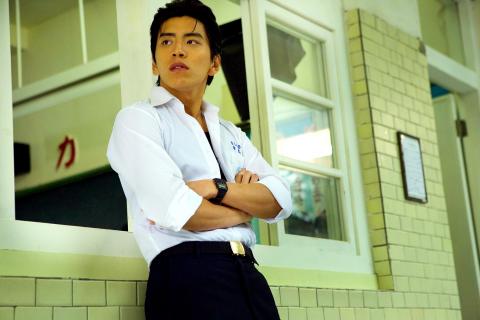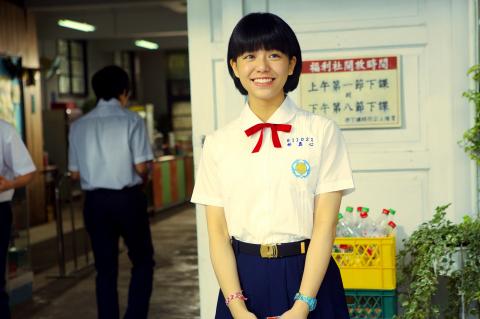Adolescent love and the 1990s come under the microscope in Our Times (我的少女時代), an ambitious movie that could become a summer blockbuster.
Frankie Chen (陳玉珊), in her directorial debut, revises the “ordinary girl meets Prince Charming” tale, injecting a welcome dose of feminine perspective into the overused genre to touch upon the life experience of a girl becoming a woman in 1990s Taiwan. The comedy is supported by an appealing cast of novices, veterans and big-name stars.
It’s present-day Taipei, Truly Lin (Joe Chen, 陳喬恩) is in her thirties and stuck in a dead-end job. One night Lin suddenly recalls her first love, a high school romance that took place in 1994. The younger Lin, played by Vivian Sung (宋芸樺), is a plain, clumsy girl who spends her high-school days goofing around with friends and fawning over the most popular boy in school, Ouyang (Dino Lee, 李玉璽). An unfortunate incident leads Lin to become an errand girl for the school’s much-feared troublemaker Taiyu (Darren Wang, 王大陸).

Photo courtesy of Hualien Media International
It doesn’t take long, however, before Lin sees Taiyu for who he really is: a kind, smart young man. As their friendship evolves, they agree to help each other attract the people they are interested in and in the process Lin and Taiyu soon fall in love.
Meanwhile, Taiyu’s tough behavior results in a clash with school authorities and several street fights. Concerned, his parents send him to the US before he has a chance to say goodbye to Lin.
Fast forward two decades, Lin quits her job and breaks up with her boyfriend. Across town, a sold-out Andy Lau (劉德華) concert is set to take place at the Taipei Arena, where two surprises await our heroine.

Photo courtesy of Hualien Media International
The light-hearted, briskly-paced film is a collaboration between Chen, a seasoned producer of soap operas and top-notch film producer Yeh Ju-fen (葉如芬). The experiences of these two veteran producers show in how well they can pick their cast, which, not to give the film away, include two Asian heartthrobs.
Another pleasant surprise is up-and-coming actress Sung, who captured the public’s attention with her performance the romantic comedy Cafe. Waiting. Love (等一個人咖啡) last year. Sung comes off as a lovable ugly duckling growing to become a strong, attractive girl, while playing well with the comic effect without caricaturing her role.
Chen and her crew have also done a fine job with their attention to detail of the era. Hairstyles, pop songs, sports drinks, tea houses, scary chain letters circulated in school and teenage obsessions with pop stars Lau and Aaron Kwok (郭富城) all create the right 1990s vibe. But the movie isn’t set in the 1990s simply for fun and decoration. It recalls a society that has just emerged from almost 40 years of martial law, an experience that makes the heroine who she is today.
With the screening time exceeding two hours, however, the movie could have used some pruning to keep its structure tighter and story snappier. Plotlines revolving around the two protagonists become repetitive at times, adding no new meaning to the narrative.

In the March 9 edition of the Taipei Times a piece by Ninon Godefroy ran with the headine “The quiet, gentle rhythm of Taiwan.” It started with the line “Taiwan is a small, humble place. There is no Eiffel Tower, no pyramids — no singular attraction that draws the world’s attention.” I laughed out loud at that. This was out of no disrespect for the author or the piece, which made some interesting analogies and good points about how both Din Tai Fung’s and Taiwan Semiconductor Manufacturing Co’s (TSMC, 台積電) meticulous attention to detail and quality are not quite up to

April 21 to April 27 Hsieh Er’s (謝娥) political fortunes were rising fast after she got out of jail and joined the Chinese Nationalist Party (KMT) in December 1945. Not only did she hold key positions in various committees, she was elected the only woman on the Taipei City Council and headed to Nanjing in 1946 as the sole Taiwanese female representative to the National Constituent Assembly. With the support of first lady Soong May-ling (宋美齡), she started the Taipei Women’s Association and Taiwan Provincial Women’s Association, where she

Chinese Nationalist Party (KMT) Chairman Eric Chu (朱立倫) hatched a bold plan to charge forward and seize the initiative when he held a protest in front of the Taipei City Prosecutors’ Office. Though risky, because illegal, its success would help tackle at least six problems facing both himself and the KMT. What he did not see coming was Taipei Mayor Chiang Wan-an (將萬安) tripping him up out of the gate. In spite of Chu being the most consequential and successful KMT chairman since the early 2010s — arguably saving the party from financial ruin and restoring its electoral viability —

It is one of the more remarkable facts of Taiwan history that it was never occupied or claimed by any of the numerous kingdoms of southern China — Han or otherwise — that lay just across the water from it. None of their brilliant ministers ever discovered that Taiwan was a “core interest” of the state whose annexation was “inevitable.” As Paul Kua notes in an excellent monograph laying out how the Portuguese gave Taiwan the name “Formosa,” the first Europeans to express an interest in occupying Taiwan were the Spanish. Tonio Andrade in his seminal work, How Taiwan Became Chinese,